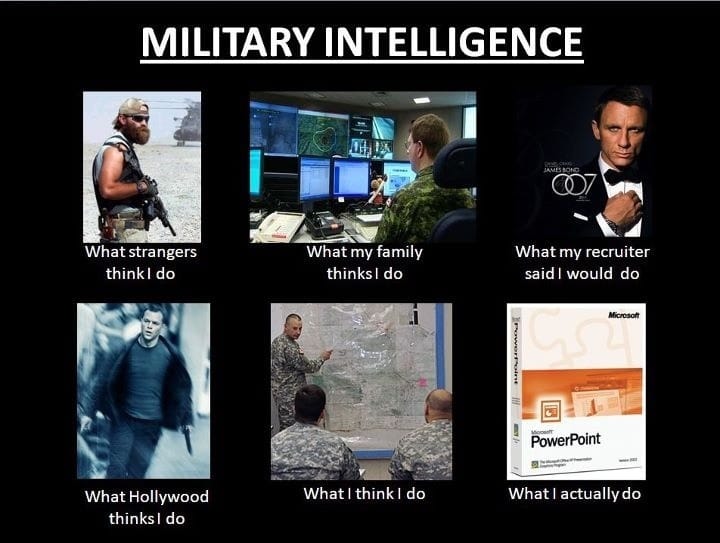What I Do All Day as a Military Intelligence Officer—and Why It’s Hard to Explain to My Mom
What do military intelligence officers actually do—and why is it so hard to explain to the people we love? On Mother’s Day, I try.

A Marine intelligence officer reflects on his work—and the fierce, brilliant mother who helped shape it.
A Mother’s Day letter of sorts.
“Wait, are you even allowed to tell me that?”
That’s what my mom asked the first time I tried to explain my job.
She didn’t say it with fear. Just focus—like she was already scanning for what I couldn’t say.
And in a way, that sums up the job.
We watch what others miss. We think before we speak. We keep things quiet—because lives depend on it.
When I tell people I work in military intelligence, I usually get three reactions: curiosity, silence, or James Bond jokes. Some imagine hacking. Others think I read secret files in a bunker. My mother—brilliant, aggressive, and commanding in the best sense—just wanted clarity.
So today, I want to give her that—not just clarity, but a sense of what this quiet, strange work really is.
Because no, I’m not a spy. And no, I don’t know everything.
But I do know this: intelligence is a discipline built on uncertainty.
What Military Intelligence Really Is
Marine Corps doctrine defines intelligence as:
“Knowledge of the enemy and the environment.”
— MCDP 2: Intelligence
It sounds broad because it is. Intelligence isn’t a single skill—it’s a function. A process. A disciplined pursuit of clarity in a world designed to obscure it.
We collect information—from satellites, sensors, intercepted signals, open-source reports, or even a single Marine staring through a scope at dusk. Then we piece it together. We ask: What does it mean? What might happen next? What don’t we know?
But intelligence doesn’t exist for its own sake. It exists to support decisions.
As MCDP 1: Warfighting reminds us:
“All decisions are based on imperfect information. The role of intelligence is to improve the commander’s understanding of the situation.”
We don’t fire the weapon—we help aim it.
And that distinction? That’s where I see the difference between my mother and me.
She pushes through friction. I read around it.
She thrives on decisive action. I trade in hesitation—in waiting for the right pattern to emerge.
She’s kinetic. I’m predictive.
But we’re both driven by the same thing: a need to understand, and a refusal to be caught off guard.
That instinct—to watch closely, think deeply, and prepare before anyone else does—shapes the day-to-day reality of my job.
What I Actually Do (And Why I Secretly Love It)
I’m a Marine Corps intelligence officer stationed in the Pacific. I spend most of my days inside a SCIF—a secure facility—coordinating the collection of information on threats to our forces.
I manage ISR (intelligence, surveillance, and reconnaissance) platforms—ensuring we’re looking at the right thing, at the right time, from the right angle.
I work with analysts to build target packages—intelligence briefs that help strike threats precisely.
I assess enemy air defenses—not just where their missiles are, but how they think and respond.
I monitor patterns. I flag anomalies. I plan for what might go wrong.
And honestly? Part of me is still that kid who memorized the stats of every Soviet tank in Wargame: Red Dragon and plotted bombing campaigns in Hearts of Iron IV like they were puzzles.

Back then, the numbers were a game.
Now they’re tied to real pilots, real targets, real consequences.
Same mind. Heavier game.
This job lets me live at the intersection of professional purpose and personal obsession. I am, quite literally, a threat subject matter expert—something I used to pretend to be. The stakes are real now. But the core joy remains: decoding how systems work, anticipating outcomes, and shaping events through understanding.
But obsession isn’t enough. The value of intelligence isn’t in knowing things—it’s in applying that knowledge when it counts.
No Intel, No Decision
Intelligence doesn’t win wars by itself. But no war gets won without it.
Every fire mission, every flight route, every amphibious landing begins with a question: Where is the threat? What’s changed? What’s the enemy thinking?
As JP 2-0 makes clear, intelligence supports all phases of operations and must be integrated from the beginning.
For example: Say a commander needs to insert aircraft near contested airspace. Do we know where the enemy’s missile systems are? Have they moved? Are their radars active?
If we assess increased risk and recommend rerouting the flight, that’s a real-world impact. No headlines—but maybe lives saved.
We’re not trying to know everything. We’re trying to know enough—to tip the odds.
Sometimes that means recommending a strike. Sometimes it means saying, “Not yet.”
And when we get it right—when we change the plan, avoid the threat, or buy our forces a better outcome—it rarely makes headlines. But it makes all the difference.
The Invisible Work
Here’s the catch: when we do our job right, no one notices.
That’s by design. We don’t publish. We don’t post. And most of the time, we can’t even tell the people closest to us what we’re working on.
There are no medals for the movement that never happened. No citations for the enemy who changed their mind.
But sometimes, because we noticed one small shift, someone gets to come home.
That quiet kind of work? The unseen, uncredited kind?
I recognize it.
Because I saw it growing up.
My mom didn’t always get recognition. But she made hard decisions. She absorbed stress no one else saw. She led people—and carried their weight—without ever slowing down.
She didn’t show hesitation. Even when I now know she must have felt it.
And that’s the kind of strength I’ve come to understand more deeply since putting on this uniform.
So Why Do It?
Because it matters. Because it’s needed. Because I believe in protecting those who carry the weight of the mission.
I like systems. I like ambiguity. I like pulling on threads until they reveal a shape.
And most of all, I like knowing that my clarity enables someone else’s courage.
Even better? I get to indulge the part of me that still marvels at radar bands, missile designations, and order of battle data (what the enemy has, where it is, and how it moves).
It’s not glamorous. But it’s exactly where I’m meant to be.
And while most of what I do stays behind closed doors, the logic of it—the role I play—might feel familiar to people in entirely different careers.
A Civilian Analogue
If you're looking for a comparison, think of a financial risk analyst who spots a market anomaly that prevents a billion-dollar loss. Or a cybersecurity lead who quietly patches a vulnerability before a breach ever happens. They don’t launch products or command headlines. But without them, things go wrong—expensively, publicly, sometimes catastrophically.
That’s what military intelligence feels like. We don’t carry rifles. We don’t fly jets. But we enable the people who do—by making sure they’re not walking into a trap. Most days, if we’ve done it right, no one notices. That’s the job.
You’re not the one executing the trades or flying the mission. But you flag what others miss. You track patterns, reduce uncertainty, and guide decisions under pressure.
And when things go right, no one notices.
That quiet kind of impact? It’s not glamorous. But it’s exactly where I’m meant to be.
A Final Note, to One Person in Particular
Mom—if you’re reading this: yes, I’m allowed to say all this.
And I’m glad you asked.
You’re not like me. You’re louder, bolder, faster to act.
You’re more commander than analyst.
More heat than quiet pattern.
But I see now that what I do was shaped by the way you moved through the world—because someone had to.
I support people like you now. I help them see more clearly, plan more wisely, strike more precisely.
You taught me to move with purpose. To act when ready. And maybe most importantly, to stay composed under pressure—even when I didn’t feel it.
So no, I’m not a spy.
No, I don’t know everything.
But I do know this:
You brought the fire. I learned to steady it. And for that, I’m grateful.
Happy Mother’s Day.
The opinions expressed are those of the author alone and do not reflect those of the U.S. Marine Corps, the Department of Defense, or any part of the U.S. government.
